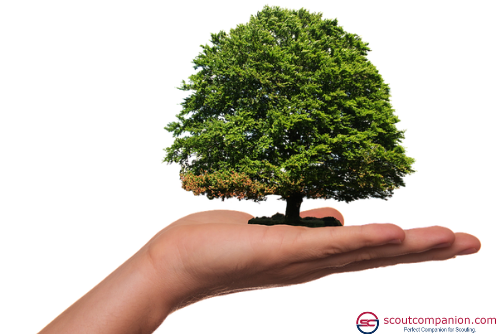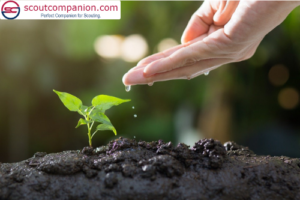Scouting is all about outdoor fun and activities, working together as a team, becoming a good leader and good citizen, and helping the community. One of the most important parts of scouting is taking care of the environment which aligns with the LNT Principles of Scouting. Scouts often work on projects that help to protect nature including teaching others about conservation, cleaning up parks or trails, or finding new ways to keep their communities green and healthy. In this article, we’ll look at some of the best conservation projects for scouts. To learn more about conservation projects for scouts, you can explore the Boy Scouts of America Official Site.
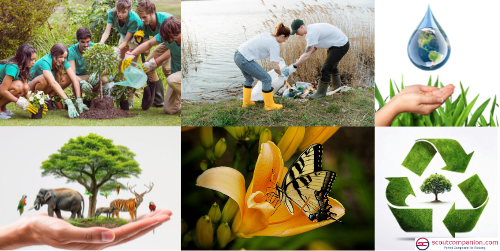
Table of Contents
Introduction
Conservation projects provide scouts an incredible opportunity to make a positive impact on the environment while developing essential life skills. These hands-on activities teach scouts the importance of teamwork, leadership, and responsibility as they work together to address real-world environmental challenges. Activities like planting trees, restoring habitats, conserving water, or protecting wildlife allow scouts to connect with nature, explore creative solutions, and leave a lasting impact on their communities. Doing these projects is not just about helping and protecting our planet but also gives scouts a chance to learn new skills and make a real difference in the real world. Additionally it is a great way to earn advancement or community service hours while doing something meaningful.
Top 10 Conservation Projects for Scouts
The need for conservation projects in scouting is crucial as they provide scouts with the opportunity to actively contribute to environmental protection while developing essential skills and also fosters a deep connection with nature. These ideas are not only fun and rewarding, but they also help scouts to connect with nature, learn how to care for it, and take on responsibility for making the world a better place for the future. The following are the top 10 conservation projects the scouts can work on for the well-being of our planet Earth by preserving its natural environment for the future.
- Tree Planting Initiatives
- Habitat Restoration project
- Beach and River Cleanups
- Pollinator Gardens
- Sustainable Gardening and Farming
- Water conservation Campaigns
- Wildlife monitoring and citizen Science
- Recycling and Upcycling Projects
- Energy Efficiency and Renewable Energy Projects
- Environmental Education and Advocacy
1. Tree Planting Initiatives
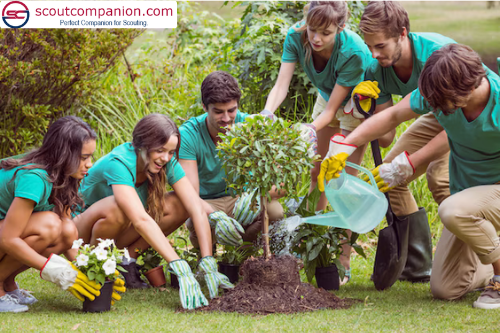
Planting trees is one of the simplest and most effective ways scouts can help the environment. Trees are incredibly important as they give us oxygen to breathe, clean the air, conserve water, protect the soil from erosion, and provide homes for wildlife. By organizing or joining tree planting events, scouts can make a big, visible difference in their communities.
Scouts can work with local governments and organizations like schools, colleges, universities, hospitals, and environmental groups to organize tree planting events. Sometimes, cities or towns have areas that need more trees, whether for reforestation or just to make the space more beautiful. This gives scouts a chance to directly improve the green spaces in their neighborhoods.
What Scouts Learn from tree planting initiatives:
- Working as a team and coordinating tasks
- Planning and organizing projects
- Gaining a deeper understanding of nature and the environment
How It Helps the Community:
- Reduces the impact of climate change
- Creates homes for wildlife, boosting biodiversity
- Makes parks and public areas more enjoyable for everyone
2. Habitat Restoration Projects
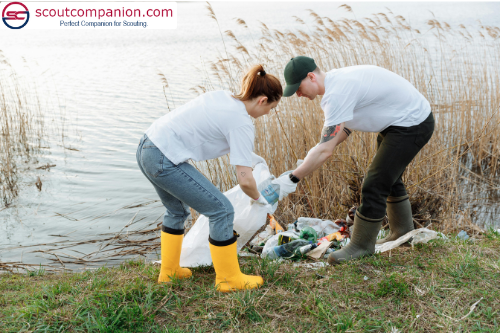
Habitat restoration focuses on bringing damaged ecosystems back to life. This can include activities like cleaning up polluted rivers, planting native plants, removing invasive species, and restoring wetlands. These types of projects provide scouts with an opportunity to protect the environment and gain a deeper understanding of how ecosystems work. Scouts also learn about the importance of biodiversity and how every species plays a role in maintaining ecological balance. By engaging in these efforts, scouts contribute to the long-term health of their local environment.
Scouts can team up with local conservation groups, wildlife organizations, or national parks to restore specific areas in need of attention. Through their involvement, they will not only make a significant impact but also learn how different elements of nature rely on each other to maintain balance. By taking part in these projects, scouts gain valuable knowledge about the delicate processes that keep ecosystems healthy and functioning.
What Scouts Learn:
- Hands-on techniques for restoring the environment
- How ecosystems and biodiversity work together
- How to observe and study nature like a scientist
How It Helps the Community:
- Creates safe habitats for endangered or at-risk animals
- Supports healthier ecosystems in the area
- Raises awareness about local environmental issues and ways to help
3. Beach and River Cleanups
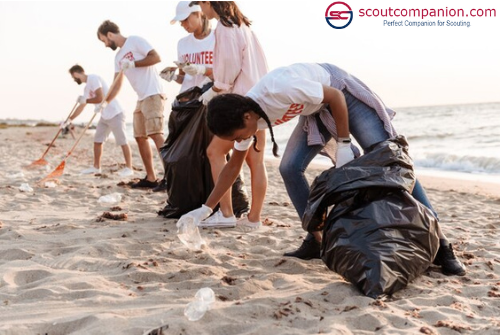
Cleaning up beaches, rivers, lakes, and other natural areas is a straightforward yet impactful way for scouts to protect the environment. Pollution, especially plastic waste, is a major threat to wildlife and ecosystems, often harming animals and disrupting habitats. By organizing cleanup efforts, scouts can help remove trash from these spaces, preventing further damage and raising awareness about the growing pollution problem.Through these efforts, scouts also inspire others in their community to take action in reducing waste and protecting nature. It’s a powerful reminder that every small contribution makes a significant difference.
These cleanup projects can vary in scale, from small, local efforts to larger, community-wide initiatives. For larger projects, scouts can collaborate with schools, local community groups, or environmental organizations, which helps expand their reach and maximize their impact. Working with others strengthens the sense of community and encourages collective responsibility for protecting natural areas. These partnerships also provide valuable opportunities for scouts to network, build leadership skills, and contribute to projects with long-lasting benefits.
What Scouts Learn:
- How to protect the environment and manage waste responsibly
- Working with others to tackle community problems
- Planning and staying safe during cleanup efforts
How It Helps the Community:
- Keeps harmful pollutants out of nature and away from wildlife
- Prevents the spread of invasive species caused by human activity
- Encourages people to dispose of waste responsibly and care for their surroundings
4. Pollinator Gardens
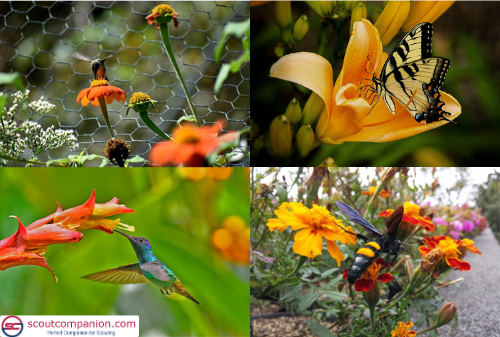
Pollinators like bees, butterflies, and hummingbirds are essential for producing the food we eat and maintaining healthy ecosystems. These creatures play a key role in pollination, which helps plants grow and reproduce. Sadly, their populations are declining due to habitat loss, pesticide use, and climate change. Protecting pollinators is crucial for food security and biodiversity. We can help reverse their decline and support thriving ecosystems by pollinator gardens.
Creating pollinator gardens is an impactful way for scouts to support these vital species and help address this issue. Pollinator gardens are filled with native flowering plants that provide food, shelter, and a safe habitat for pollinators. Scouts can get involved by designing, planting, and maintaining these gardens in spaces like schools, parks, community centers, or even their own neighborhoods. Beyond helping pollinators, these gardens can educate the public about their importance and inspire others to take action.
What Scouts Learn:
- Gardening and how to care for plants
- How pollination works and why biodiversity matters
- Planning and landscaping skills
How It Helps the Community:
- Provides a safe space for local pollinators to thrive
- Raises awareness about the critical role of pollinators
- Adds beauty to public spaces and community areas
5. Sustainable Gardening and Farming
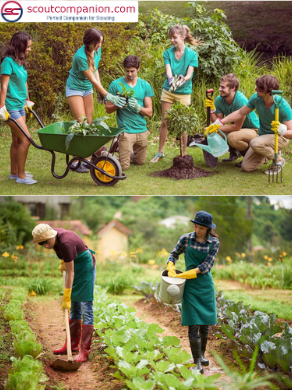
Sustainability is essential for protecting natural resources, and scouts can play a big role in promoting eco-friendly gardening and farming practices. Projects like starting a community garden, teaching others to grow food using organic methods, or encouraging composting can make a huge difference in how communities interact with the environment. These projects not only help reduce environmental harm but also teach others the value of growing food in a sustainable way.
Scouts can take this a step further by educating schools, neighborhoods, or local organizations about sustainable practices. This could include showing people how to conserve water in gardens, use fewer chemicals, or rotate crops to keep soil healthy. These simple steps not only protect the planet but also help people develop habits that are better for the environment.
What Scouts Learn:
- How to use sustainable gardening and farming techniques
- Composting methods and ways to reduce waste
- Public speaking, education, and outreach skills
How It Helps the Community:
- Promotes local food production and improves food security
- Lowers the environmental impact of farming and gardening
- Encourages eco-friendly habits that make everyday life more sustainable
6. Water Conservation Campaigns
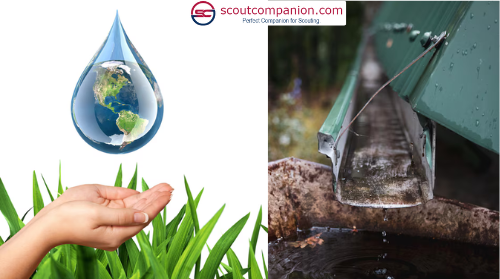
Water is one of our most valuable resources, but it’s also limited and becoming scarcer in many parts of the world. That’s why water conservation is so important, and scouts can make a real difference by leading projects that promote smarter water use. These could include organizing educational campaigns to teach others about saving water, hosting workshops on water-saving practices, or starting initiatives to help communities use water more efficiently.
Scouts can also take on hands-on projects like installing rainwater harvesting systems or designing water-efficient gardens using drought-tolerant plants. These types of projects are perfect for schools, community centers, or even public parks, where they can have a lasting impact. By raising awareness and creating practical solutions, scouts not only help conserve water but also encourage others to adopt more sustainable habits.
What Scouts Learn:
- Practical techniques for saving and managing water efficiently
- How to run outreach campaigns and educate the community
- Insights into environmental policies and the importance of advocacy
How It Helps the Community:
- Reduces water usage and waste, helping conserve local resources
- Educates people about why water conservation matters and how they can contribute
- Promotes long-term sustainability through better water management practices
7. Wildlife Monitoring and Citizen Science
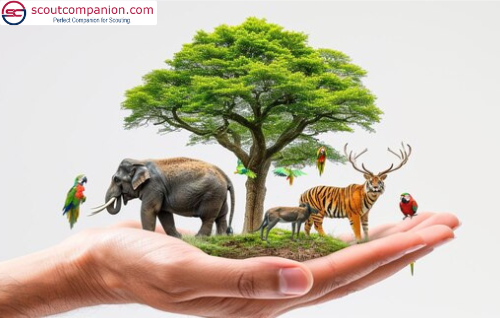
Citizen science is all about everyday people working with scientists to gather information and contribute to real research. Scouts can play a key role in these efforts by participating in wildlife monitoring programs. These programs help to track the health of local animal populations and give scouts the chance to observe nature closely. For example, scouts might monitor bird populations, document wildlife activity in parks, or help track the migration patterns of different birds and different species.
By collecting and sharing this data, scouts contribute to important scientific research that helps protect wildlife and ecosystems. Along with this they also develop critical skills like observing wildlife, collecting and analyzing data, and understanding how animals interact with their environment. It’s also a great way to build connections with scientists and conservation organizations while learning about the bigger picture of biodiversity and conservation.
What Scouts Learn:
- How to collect and analyze scientific data in the field
- Wildlife tracking techniques and the importance of observation
- Collaboration with experts and organizations working in conservation
How It Helps the Community:
- Provides valuable data for wildlife conservation and research efforts
- Raises awareness about the importance of protecting local wildlife
- Supports biodiversity by helping scientists understand and address environmental challenges
8. Recycling and Upcycling Projects
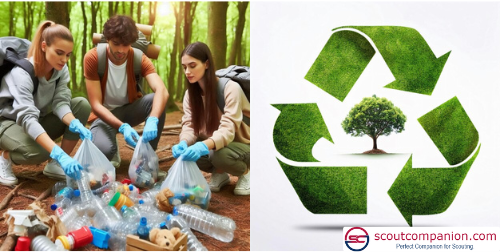
Recycling and upcycling are great ways to reduce waste and make the most of the materials we already have. Scouts can lead the charge by organizing recycling drives in their community, teaching others about how to recycle properly, or taking part in upcycling projects. Upcycling is all about turning old or unused items into something new and useful, like making tote bags from old clothes or building planters out of plastic bottles. These projects not only reduce waste but also foster creativity, helping scouts and others think outside the box when it comes to reusing materials. They show that we don’t always need to buy new items when we can repurpose what we already have.
These projects are a fun and creative way to help protect the environment while also teaching important skills. By showing people how to reuse and repurpose items, scouts can encourage others to think twice before throwing things away. They also help reduce the amount of waste sent to landfills, which benefits both the environment and the community. Through these initiatives, scouts help spark positive changes in local waste management practices, ma
What Scouts Learn:
- How to manage waste and reduce environmental impact
- Creative problem-solving through upcycling projects
- How to educate and inspire others about sustainability
How It Helps the Community:
- Reduces waste going to landfills and promotes cleaner spaces
- Educates the community about the importance of recycling and reusing
- Creates new and useful items from old materials, which can benefit others
9. Energy Efficiency and Renewable Energy Projects
Renewable energy is one of the most powerful tools we have to combat climate change, and scouts can play a key role in promoting sustainable energy solutions. Scouts can take on projects that encourage the use of renewable energy sources like solar, wind, or hydroelectric power. This could include installing solar panels on community buildings, setting up small wind turbines, or hosting workshops to teach others about energy-efficient practices.
In addition to promoting renewable energy, scouts can educate their communities on reducing energy consumption. They might organize events to demonstrate the benefits of switching to LED lighting, using energy-efficient appliances, or adopting simple habits like turning off unused electronics. These projects often involve collaboration with experts and provide scouts with valuable insights into sustainable living.
What Scouts Learn:
- How renewable energy technologies work and their environmental benefits
- Practical energy-saving techniques and conservation methods
- Advocacy skills to promote sustainable energy practices and policies
How It Helps the Community:
- Reduces overall energy consumption, leading to lower carbon footprints
- Encourages the use of renewable energy, reducing dependence on fossil fuels
- Raises awareness about energy conservation and its importance for a sustainable future
10. Environmental Education and Advocacy
Taking action to protect the environment is important, but raising awareness and educating others is just as vital. Scouts can make a big difference by organizing workshops, creating educational materials like brochures or posters, or launching campaigns to address environmental challenges such as climate change, pollution, and wildlife conservation.
Through these projects, scouts can spread awareness and inspire others to take meaningful steps toward sustainability. These efforts can also encourage local or even national governments to adopt environmentally friendly policies. By focusing on education and advocacy, scouts not only make their voices heard but also empower their communities to join the fight for a healthier planet.
What Scouts Learn:
- Public speaking and how to effectively present information
- Developing campaigns, including the use of social media for outreach
- Understanding and promoting environmental policies and advocacy
How It Helps the Community:
- Increases awareness about critical environmental issues
- Encourages individuals to adopt sustainable habits in their daily lives
- Contributes to positive changes in local or national environmental policies
Conclusion
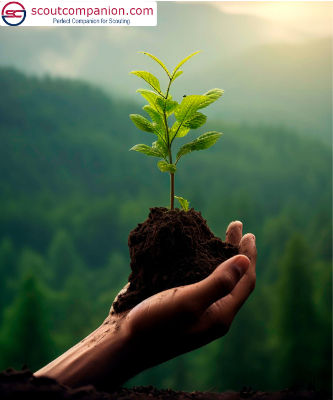
Conservation projects are a vital part of scouting, giving scouts the chance to connect with their communities, build valuable skills, and make a real difference in protecting the environment. Conservation projects from planting trees and restoring habitats to conserving water and promoting renewable energy leave a positive impact in their surrounding whereas cleaning up a beach, advocating for sustainable practices, or creating a pollinator garden will make the scouts contribute to a healthier and greener future. These projects not only help our planet Earth but also help scouts grow as individuals by strengthening their leadership, teamwork, and problem-solving skills while teaching the value of hard work and dedication.
